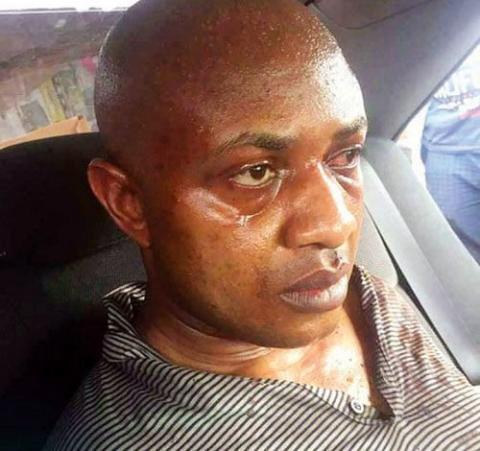
The presiding judge, Justice Abdulaziz Anka, dismissed the argument made by the counsel for the Lagos State Commissioner of Police and the Special Anti-Robbery Squad (SARS), Emmanuel Eze, that the case was not ready to be heard because the Inspector-General of Police and the Nigerian Police, the first and second defendants in the suit, were served the originating summons in Lagos instead of Abuja.
The Federal High Court in Lagos on Wednesday ruled against the Nigerian Police’s plea for adjournment and fixed August 29 for judgment on the N300m fundamental human rights suit filed by billionaire kidnapper Chukwudumeme Onwuamadike, more popularly known as Evans.
The presiding judge, Justice Abdulaziz Anka, dismissed the argument made by the counsel for the Lagos State Commissioner of Police and the Special Anti-Robbery Squad (SARS), Emmanuel Eze, that the case was not ready to be heard because the Inspector-General of Police and the Nigerian Police, the first and second defendants in the suit, were served the originating summons in Lagos instead of Abuja.
He upheld the argument made by Evans' lawyer, Olukoya Ogungbeje, that by virtue of Order 5 Rule 2 of the Fundamental Rights Procedure Rules 2009, the IGP and the Nigerian Police were rightly served through their agents at Alagbon division.
The judge, in his ruling, lampooned Mr. Eze, who appeared for the third and fourth respondents, saying that he had no right to “open his mouth” in defense of a matter that did not concern him, as such “amounts to using panadol for another man's sickness.”
Justice Anka agreed that the coast was clear for the hearing of the suit and ordered the counsels to argue their applications on the substantive suit.
He also ruled against the contention of the respondents that a vacation judge could not sit on the matter, arguing that any case with a direct implication on the liberty of any citizen must be treated as urgent.
Therefore, he argued that Evans' case could be attended to during vacation.
Mr. Eze had argued that a short adjournment be given for him to adequately prepare for the hearing. He further stated that the business of the day, as recorded during the last proceeding, was ruling on the disagreement on service, stating that he was not prepared to argue the substantive suit.
Mr. Ogungbeje, however, opposed the application for an adjournment. He reasoned that since all processes had been filed, served and responded to, the respondents should be deemed ready to argue their position.
“I submit that there is no basis for adjournment when all processes have been served. If there is anyone to apply for adjournment, it should be the applicant,” Mr. Ogungbeje said. “Eze has his freedom, he is here in court but he wants the applicant to remain in their custody.”
Mr. Ogungbeje insisted that the police had violated Evans' rights by detaining him since June 10, 2017 without charging him to court.
He contended that the continued detention of Evans without a court order was unlawful and a violation of the suspect's rights under under sections 35 (1) (c) (3) (4) (5) (a) (b) and 36 of the Constitution.
He therefore urged the court to compel the police to charge Evans to court immediately or to release him if they were not ready to bring him to court and arraign him.
But opposing him, Mr. Eze, who appeared for the Commissioner of Police in Lagos State and the Special Anti-Robbery Squad, insisted that Evans' rights were not being violated, because, according to him, Section 35(7) of the Constitution gave the police power to detain a suspected capital offender without any court order.
He further argued that the offenses allegedly committed by Evans were grievous and as such his fundamental rights were not absolute.
Mr. Eze said it would be premature for the police to either charge Evans to court or release him because the suspect was helping the police in investigations towards tracking down his gang members.
He added that it would dangerous to yet release Evans into the society.
Henry Obasi, counsel for the IGP and the Nigerian Police, pursued the same line of argument and urged Justice Anka to dismiss Evans' suit.
He submitted that the police had the power to arrest and detain any suspect of a capital offense for up to 90 days without a court order.
But Mr. Ogungbeje urged the judge to dismiss the submission by Mr. Obasi, saying he did not file any court paper on behalf of the IGP and the Nigerian Police.
He further stated that the section of the Constitution quoted by the counsel was wrongly interpreted.
“It is only where an accused person has been charged to court and now seeking bail that the section can come in. What the police ought to have done was charge the man to court after two days and apply for him to be kept in their custody so that they could conclude investigation, but since they have not arraigned him in court in the first place, the section cannot be used,” Mr. Ogungbeje argued.
He urged the court to disregard the plea of the respondents as not tenable.
After listening to the parties, the judge adjourned to August 29 for judgment.
Evans had sued the IGP, the Nigerian Police, the Lagos State CP, the Lagos State Police Command and SARS for wrongful detention and subjecting him to an undue media trial.
